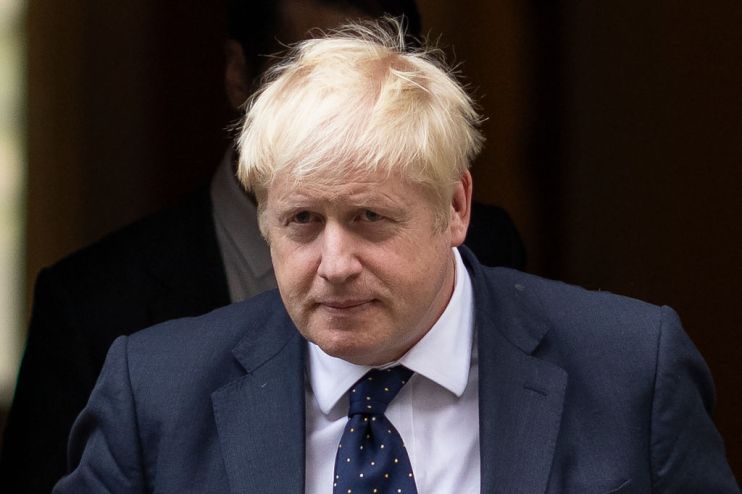Editorial: A Tory tax raid means Boris mustn’t break his promises again

“You can’t fix the Covid backlog without giving the NHS the money it needs, you can’t fix the NHS without fixing social care, you can’t fix social care without removing the fear of losing everything to pay for social care and you can’t fix health and social care without long term reform.”
This is the virtuous circle Boris Johnson is using to justify the hikes on national insurance and dividend tax. Britons will fork out an extra £12bn as a result of the 1.25 per cent rise to national insurance and an identical rise on the amount paid to shareholders.
Tax hikes are rarely temporary, especially when they are called a ‘health and social care levy’. In theory this money is to help the NHS catch-up with waiting lists; we would wager that if waiting lists drop to nothing in two years’ time, we are unlikely to see these hikes reversed. Brits are already taxed at record levels – those levels will rise. That is not good. Economic growth, sustained over the medium to long-term, is the way to rebuild the country’s post-pandemic finances.
That Johnson has chosen to go the other way is a worry.
But for now the question is whether or not Boris’ plan – his legacy – is to be a promise-breaking tax raid or genuinely impactful.
The run-up to today’s announcement has been lengthy. Sir Andrew Dilnot’s review into social care was published in 2011 and successive Governments have passed the political hot potato of what we do with our nation’s most vulnerable. No more, Johnson would have us believe.
The question of paying for social care and fixing social care are often conflated. Boris has chosen working people and businesses as his funding source. Now, then, the central challenge is if we can fix it. Anybody looking for answers beyond a tax hike today would have been left disappointed.
NHS waiting lists could reach 13 million, but the NHS is clogged up looking after elderly, frail or disabled people who can’t be adequately cared for by social care providers. This is a vicious cycle. At the beginning of Covid, there were 30,000 people in hospital who could be better looked after in social care. This, Johnson said, is an “indictment” on our health and social care system. True.
His solution then, is to introduce a cap on the amount people pay for social care of £86,000, free social care provision for anyone with assets under £20,000 and a means-tested system for anyone who has assets between £20,000 and £100,000. It largely follows the Dilnot review.
There is also a political catch with this plan. Johnson acknowledged that he doesn’t break his manifesto commitment not to raise NI “lightly”. There is little time between when these caps and floors kick in – October 2023 – and the in-theory date of the next election in 2024. So the only metric voters’ will have to judge Mr Johnson on is the NHS, not social care. He will have alienated his Tory base with unpopular tax hikes for a high-stakes gamble.
Ultimately the underlying flaws of the system can’t be fixed without “long term reform” and that can’t be done if the health service gobbles up all the money destined for social care. But if we don’t fix social care, the problems in the health service will persist. The fear of “losing everything” is only part of the reason people turn to the NHS, it is also because they can’t get what they need under the current provision.
In total, £36bn will be raised over the next three years. For the NHS, the money will be used to push down the swollen waiting lists, give people faster access to specialists, to help diagnose problems quicker, and fund more digital services. For social care, the £5.9bn leftover will be used to “invest in quality of care, in carers themselves”, much of which will go to funding the care cap. It is a noble skeleton, with no flesh.
The care system is plagued by long-term staffing crises, only exacerbated by Brexit. Currently, what is offered by the social care system does not necessarily meet what is needed. Simon Bottery of the King’s Fund points out: a disabled adult on a home care package could only get a few short visits a week – not enough to allow them to see the friends they want. A lack of social interaction only hastens people’s entrance into fully-assisted care, creating extra burden on those homes – and the staff who run them.
What is needed is long term reform. It needs to start in people’s homes before they need to have staff on-hand 24/7. It needs to have enough well-trained and well-paid staff who can care for the elderly and frail when they need medical treatment, but not enough to warrant a visit to the hospital. Otherwise, those very same people who occupied those 30,000 hospital beds pre-Covid will wind up back there, even if they aren’t having to sell their homes to pay for social care.
This needs to be the heart of the Prime Minister’s plans to fix social care once we all stop quibbling over exactly how we pay for it. There is precious little information, as of yet, as to how he’ll do it.
If this colossal amount of money fails to produce a result, Johnson will enter the next election as the tax raising Tory who didn’t use the money wisely. That’ll be a tough sell in red and blue walls alike.
